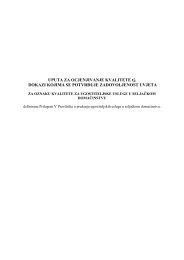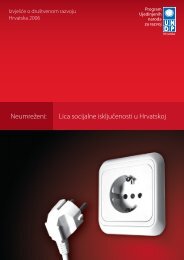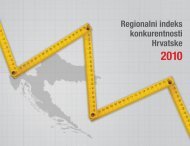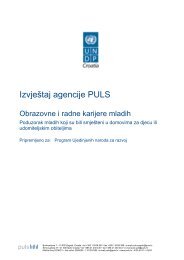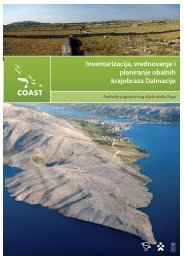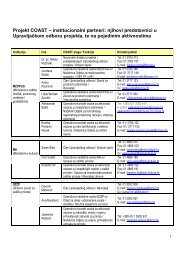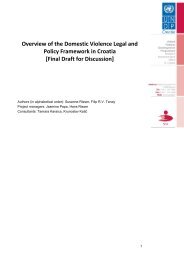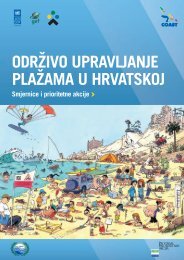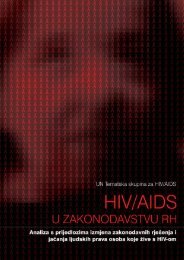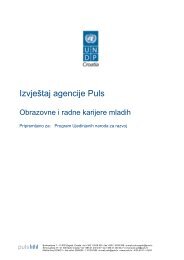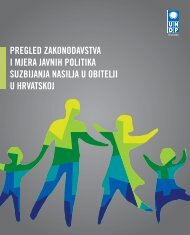WEB engleska verzija end.indd - UNDP Croatia
WEB engleska verzija end.indd - UNDP Croatia
WEB engleska verzija end.indd - UNDP Croatia
- No tags were found...
You also want an ePaper? Increase the reach of your titles
YUMPU automatically turns print PDFs into web optimized ePapers that Google loves.
THE SOCIALLY EXCLUDEDCHAPTER 3In the case of human rights violations of minoritymembers, an adequate reaction from the executivebranch of government there has not been forthcoming.Action has primarily been taken at the local andregional level. <strong>Croatia</strong>’s accession process into the EUwill represent a special challenge for the protectionof the minority rights. The establishment of a coalitionbetween the HDZ and the Serb national party,the SDSS, satisfied international observers in regardsto the first of the three pre-Copenhagen criteria forcommencing an institutional dialogue with the EU.3.2.12 Policy ImplicationsAside from the Serb and Roma minorities, nationalminorities encounter the same type of difficulties asthe majority of the population. The issues concerningthe Serb minority are approached from the perspectiveof the protection of minority rights, thus, in somecases their social rights become a political issue, whilethe Roma are primarily perceived as a socially vulnerablegroup, where their minority rights are ranked assecond-class.With regards to human rights, it is necessary to takeinto account the standpoint of the majority, accordingto whom rights are expensive, especially when they areenjoyed by minority groups. Therefore, in the case ofthe Roma, it seems that there are three alternatives. Thefirst is connected with the elimination of discriminationand the strengthening of contributions by the Romato the formal economy, thus enabling their access toservices. The second is connected with the regulation ofnon-formal economic activities and the development ofbasic measures for health and social insurance fundedthrough contributions from those informal activities.The third possibility is to create universal programmestargeting the dimensions in which the Roma are in adisadvantaged position. The universal nature of suchtargeted measures would enable access to rights, withoutresulting in stigmatisation.It is especially necessary to adopt implementing legislationwhich would serve to realise the rights of Article22 of the Constitutional Act concerning positivediscrimination in favour of minorities, when it comesto employment in public administration, state andpublic services, the judiciary and in the administrativeapparatus of local government. It is importantto form a consultative committee with the EuropeanEconomic and Social Committee, which would dealwith the development of civil society (including minorityNGOs and minority self-government) and theirinclusion in decision-making processes.Finally, the development of politically correct socialcommunication, systematic eradication of hatespeech, and encouragement of open media is necessary.Special attention should be paid to a focusedgathering of statistics on the male and female membersof minority groups, as well as the monitoring ofthe various life experiences of these men and womenin the private and public sphere. Furthermore, specialattention should be paid to the interaction of theRoma and Serb minorities with the general populationin various civil society programmes, and in measuresimplemented by the state.3.3 Returnees and IDPs 653.3.1 Human RightsAccording to the provisions of the Law on Am<strong>end</strong>mentsto the Law on the Status of Displaced Personsand Refugees (Narodne novine, 128/99.), a displacedperson (prognanik) is a person who, individuallyor in an organized manner, fled from their place ofresidence in one area of the Republic of <strong>Croatia</strong>,<strong>end</strong>angered by war, in order to avoid an immediatethreat to their life caused by aggression and otherwar activities. A returnee is a person who acquiredreturnee status pursuant to the special regulationson returnees and who returned pursuant to the 1998Program for Return and Accommodation of DisplacedPersons, Refugees and Resettled Persons (povratnik).A returnee, whose returnee status has been recognized,enjoys returnee rights for a maximum of 6months starting from the date of his/her return. Accordingto the Government of <strong>Croatia</strong>’s restructuringas of June 1, 1999, the Office for Displaced Personsand Refugees (ODPR) is responsible for managing thestatus and rights of displaced persons, returnees andrefugees.The Law on the Status of Displaced Persons andRefugees regulates the equal status and rights forreturnees and displaced persons. A returnee has the65 The section of the text on Returnees (3.3) is complemented by the section on National Minorities (3.2).53



